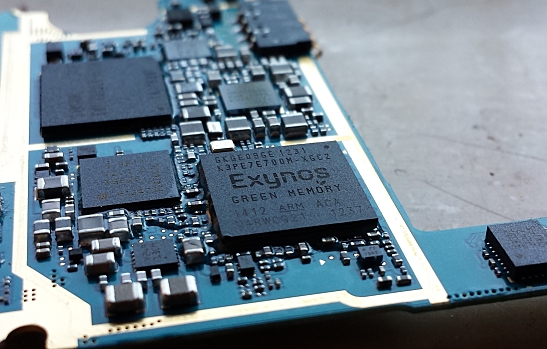Samsung is developing a 64-bit smartphone, following the lead of Apple’s recently released iPhone 5s. According to CNET, the president of Samsung’s System LSI, Stephen Woo, made the announcement in Seoul during Samsung Analyst Day 2013 on November 6.
Wednesday’s announcement included details of how Samsung plans to work toward incorporating a 64-bit chip in their mobile devices. The company is pursuing two paths to this hardware upgrade, first working on a chip based on a design from ARM, the British company that is also responsible for the A7 chip in the iPhone 5s. After the first chip is developed, Samsung plans to create an “optimized” in-house version of it.
Before the release of the iPhone 5s, smartphones generally used a 32-bit processor, at most. “Many people were thinking, why did we need 64-bit for mobile devices?” Woo said during a presentation at Samsung Analyst Day. “People were asking that question until three months ago. And now I think no one is asking that question. They’re asking, when can we have that?”
The advent of the 64-bit smartphone has resulted in faster processing speeds, with many reviews claiming that the iPhone 5s is the fastest smartphone yet. It can easily handle heavy duty processing requirements from apps, and uses the extra processing power to support fingerprint authentication and better media apps. Of course, the extra speed comes at a price, with the 64-bit chip using more battery energy than a 32-bit chip.
The increased speed for the current generation of devices is appealing, but the 64-bit mobile chip paves the way for future hardware advancements, including the ability to support more than 4GB of RAM. A 32-bit system can support 4GB of RAM at the very most, which is plenty for most current smartphone needs, but provides a firm limit on the complexity of future development. That limit is removed by the 64-bit chip. More RAM means designers can create more complex games and media apps.
Use of 64-bit chips in smartphones has been criticized as an unnecessary gimmick. The fact that a second company is doing the same thing hardly refutes that charge (see the curved screen fad), but the chip seems to fall into a different category. While its current necessity may be up for debate, the 64-bit chip is clearly the next step for mobile processing. Implementing it early can only ease the transition and allow app advancement earlier, as well as allowing the developers to refine the technology before it’s truly crucial.
Samsung has not revealed when their 64-bit smartphone will be available. Release may still be a long way off; Apple had to develop the central processing unit for their ARM-based chip in-house, as ARM itself has yet to complete the chip. According to CNET, ARM’s chip may not be commercially available until well into 2014.
What do you think—will 64-bit smartphones offer you better functionality now? Is it worth upgrading as soon as the make of your choice has a 64-bit model?
Image courtesy of Wikimedia Commons
[cf]skyword_tracking_tag[/cf]

